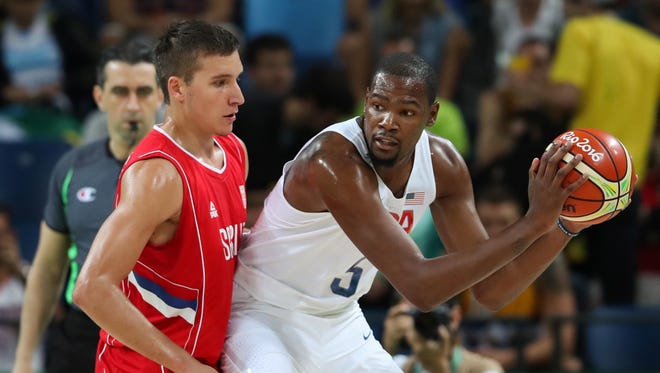USA men's Olympic basketball team holds off feisty Serbia
RIO DE JANEIRO – Once again, the U.S. found itself in a close game in the fourth quarter of the men’s Olympic basketball competition.

Once again, a disciplined offensive team — Serbia this time — gave the hyped U.S. defense trouble.
But just as the Americans did against Australia in the previous game, they survived.
Barely.
U.S. defeated Serbia 94-91 for its 21st consecutive Olympic victory and 49th consecutive international victory.
Bogdan Bogdanovic missed a three-pointer with 0.2 seconds left in the fourth quarter, a shot that could have sent the game to overtime. The USA didn’t score in the final 2:11 after Carmelo Anthony’s jump shot put it ahead 94-89.
"When we're playing, we think it's a huge game,” U.S. coach Mike Krzyzewski said. “When our opponents play, it's a huge game and we're going to get their best shot, and it's kind of free money. (They) play a game like this and (they’re) going to be celebrated win or lose. For us, that's not the case – ever. We just have to understand that.”
Kyrie Irving led the U.S. with 15 points. DeAndre Jordan had 13. Kevin Durant, Paul George and Anthony each had 12.
What has happened to the U.S. in the past two games – a 98-88 win against Australia and a nail biter against Serbia? For starters, both teams have talent, including five NBA players for Australia.
Zillgitt: U.S. men's basketball needed a game like this
Serbia’s Milos Teodosic has been one of the Europe’s best point guards for the last decade. He’s a brilliant passer and capable scorer. Denver Nuggets center Nikola Jokic (25 points, six rebounds) made the NBA’s all-rookie first team in 2015-16 and center Miroslav Raduljica (18 points) is another skilled low-post player.
Like Australia, Serbia has continuity. Its national team plays together often in world and European tournaments. The U.S. has 10 first-time Olympians and six players who playing in their first major international tournament.
“We do have more talent, and we have to get our talented playing much better as a team,” Krzyzewski said. “Our guys are playing as a team. They just haven’t had the experience of playing that long together.”
Australia and Serbia have provided an offensive blueprint centered on ball movement and player movement, and it’s difficult for a team not used to such plays to defend possession after possession.
“Once you move the ball, they are always chasing somebody. Once you stop the ball, they just go one-on-one, and that’s very tough to beat against athletic players,” Serbia coach Aleksandar Djordjevic said.
Teodosic, who had 18 points and six assists, said it’s not only the extra pass, it’s the pass after the extra pass that leads to better offensive opportunities.
“These international guys really know how to move and really know how to cut,” George said. “It’s more about how they’re running their offense. It’s wearing us down.”
NBA offenses are often based on ball and player movement. But there are stylistic differences between European and NBA offenses, George explained.
“In our game, there’s movement, but these guys, there’s constant movement,” he said. “You don’t ever sit still. In our game, there’s moments when you’re sitting still. You can have a rest period where there’s action on the other side. You’re constantly moving side to side and it’s like they don’t get tired. That’s very new to us.”
The challenges aren’t over for the USA. Assured of a spot in the quarterfinals at 4-0, it plays France Sunday in the final game of group play, and the other group is filled with quality teams, including Lithuania, Argentina, Croatia, Spain and Brazil.
“We’re playing against an experienced offense, and we’re still trying to figure out and adjust,” George said. “Us trying to figure it out is just the case. It’s good that we’re in games like these where we pull it together and at some point, we figure it out. We’re still a special defensive group. Right now, we’re going through an adjustment period.”
